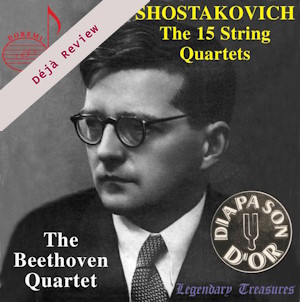
Déjà Review: this review was first published in July 2007 and the recording is still available.
Dmitri Shostakovich (1906-1975)
The 15 String Quartets
Two Pieces for String Octet
Beethoven Quartet
Komitas Quartet (String Octet)
rec. 1956-74
Doremi DHR7911-5 [5 CDs: 364]
Recordings by the Beethoven Quartet have been only intermittently available in the West until relatively recently. Their interpretations, particularly of the music of Shostakovich, have therefore been known more by reputation than reality. After all, the group gave the first performances of all the quartets apart from the first and the last, and would have done so for No. 15 had not the unexpected death of cellist Sergei Shirinsky intervened during rehearsals. In due course his place was taken by distinguished cellist Yevgeny Altman but in the interim Shostakovich, anxious to hear the work performed and perhaps mindful of his own mortality, awarded the premiere to the younger Taneyev Quartet. These recordings are in many cases the first for each work.
Among their Soviet contemporaries, the interpretations of their slightly younger colleagues in the Borodin Quartet in this repertoire are much better known, mainly because the Borodins recorded the Quartets on several occasions and performed them frequently on tour to the West. The Borodins also enjoyed a close relationship with Shostakovich although personal loyalties on the part of the composer dictated that the premieres went to the Beethovens. The Taneyev Quartet also recorded a complete cycle for Melodiya in the 1970s which is available on the Aulos label in excellent sound; that set also has much to commend it. Among Western ensembles the virtues of the Fitzwilliams and more recently the St Petersburg Quartet, for instance, are well documented.
So what can the playing of the Beethoven Quartet teach us today about Shostakovich? Well I think there is a directness of approach which is quite striking. Despite changes of personnel in later years this approach appears quite remarkably consistent. Speeds are for the most part quite fast by the standards of some later ensembles. There is naturally no lingering in a sentimental, post-Testimony kind of way. Even the later quartets, with their recurring adagio markings, are kept on the move so that the concentration rarely lapses. The very immediacy of the recorded sounds helps with this. Shostakovich knew the individual musicians of the Beethoven Quartet closely as friends and colleagues – he performed frequently with them as pianist in his Piano Quintet, for example – and was well aware of the performing styles of each member. This is often reflected in the music – for instance in the later quartets a particular instrument is highlighted as a tribute to that player and the relevant quartet bears a dedication to the player in question. At the same time we are left in no doubt that this is an ensemble which is vastly experienced in working together to create a united sound picture.
There was a release some years ago on the Consonance label in rather unsympathetic transfers. Happily in recent years Melodiya has issued some of their Shostakovich quartet performances in improved transfers but minus Nos. 2, 5, 6 and 9. These gaps are now addressed in this 5CD set from Doremi which although not without its problems is invaluable in allowing us to enjoy the consistency of the group’s approach to Shostakovich’s music. This it does in for the most part very acceptable sound.
Working from what are presumably commercial LP pressings rather than master tapes, Jacob Harnoy of Doremi has achieved good results with what in some cases appears to be some rather intractable material. In general terms the later the recording the better the sound. For Quartets Nos. 10-15, recorded between 1965 and 1974, the sound is perfectly acceptable with little or no background noise. The earlier recordings from the 1950s are more primitive, although rarely unacceptably so. The ear soon adjusts to any background noise which is rarely distracting in any case, such is the immediacy of the music-making. The exception, strangely, is Quartet No. 9, recorded in stereo around 1965. Here the performance is accompanied by a constant low-level background rasp which some listeners may find more intrusive than I did.
The presentation of this set could have been better given its price, with only a leaflet giving limited notes about the works and performers. One attractive feature is a colour photo of all the original Melodiya LP labels from which presumably the transfers were made. There are no specific recording dates given, which is a bit remiss given the historical interest of this issue. More information about the music itself would also have been welcome.
As a filler we are also offered the Beethoven and Komitas Quartets joining forces in the early two pieces for string octet.
This set is not cheap, but as a document for anyone who values unvarnished honesty of performance and a sense of a direct link to the mind of the composer it is indispensable.
Ewan McCormick
Buying this recording via a link below generates revenue for MWI, which helps the site remain free



















